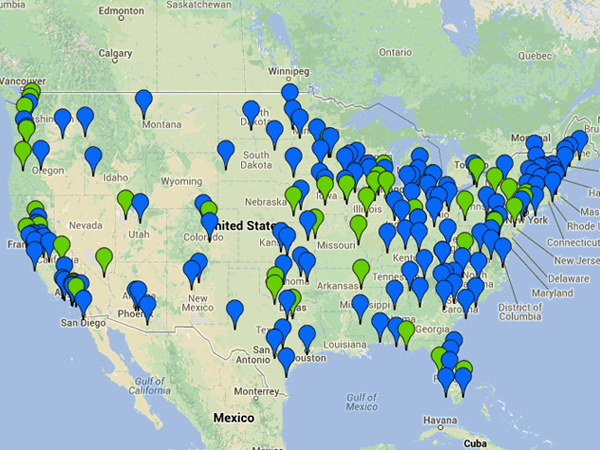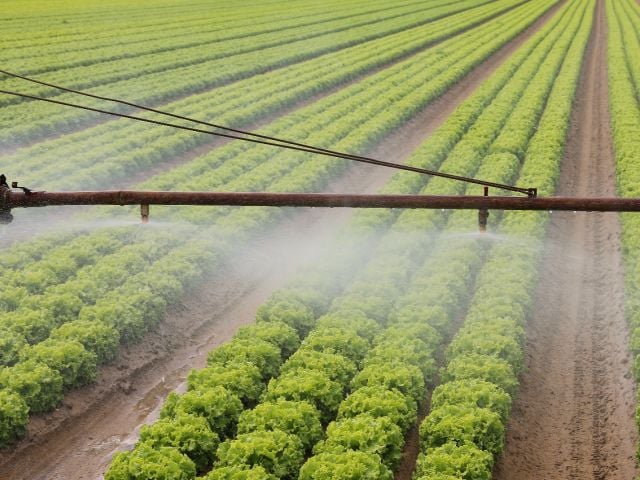
More than 30 new editorials added to EWG interactive map
An interactive map developed by the Environmental Working Group shows where more than 660 U.S. newspapers have published editorials since 2007 demanding meaningful reform of the federal farm bill. In this latest update, more than 30 new articles calling for fixes to the crop insurance program and conservation requirements have been added to the map.
Few issues trigger as much editorial page criticism of Congress, whose skewed farm bill priorities channel hundreds of billions of taxpayer dollars in farm and crop insurance subsidies to the largest and most financially secure farming operations in the country, while programs that protect the environment and feed the hungry go begging.
The newly added editorials, published between June and October 2013, consistently condemn the heavily subsidized crop insurance programs, estimated to cost taxpayers $9 billion a year. Unlike other farm subsidies, crop insurance subsidies are not subject to means testing or payment limits, and farmers are not required to implement basic measures to protect soil and water as a condition for getting taxpayer support. Moreover, taxpayers don’t even get to know who’s benefiting from these subsidies – and some are members of Congress.
As the Dallas Morning News put it:
Legislators should insist that farmers adhere to conservation guidelines if taxpayers are going to help finance their crop insurance. Farmers have previously accepted a quid pro quo when accepting other subsidies. There is no reason not to apply it to crop insurance assistance, as well.
The goal is not to punish farmers. Actually, it is to help them – and the rest of the nation – by preserving acres for tomorrow, especially in times of drought.
The newspapers’ clamor for change reflects the public’s desire for a farm bill very different from the ones currently before Congress, which would bulk up crop insurance subsidies and produce windfall profits for farm businesses. Both the Senate and House bills would add costly new provisions on top of the already bloated crop insurance program. The House bill would also take us back to the farm policy of the 1970s by having the government, rather than the market, set prices for major crops. These new subsidies and unjustifiably high price guarantees would create new incentives for farmers to plow up more and more wetlands and prairie. Plowing up highly erodible land to raise crops greatly increases the risk of soil erosion and polluted runoff unless growers take strong conservation measures.
As a Des Moines Register editorial said:
We’re losing our topsoil, our clean water, our respect for our land, our heritage, our reputation. And maybe our common sense.
There’s a way out of the toilet. It means governing to serve the best interests of all, not the handful whom your taxes have made rich.
The themes that ring out from these editorials are that the 2013 farm bill should eliminate direct payments (which both the Senate and House bills do), reduce crop insurance subsidies and use the savings to protect programs that provide food assistance to needy children and environmental protections. At a time when the farming sector is enjoying record profits, it is impossible to justify expensive and generous subsidies to profitable farm enterprises, insurance companies and their agents.
The Chicago Tribune wrote:
Federally subsidized crop insurance has morphed from a reasonable effort to protect against drought and flood into a costly and inefficient mess. The program funnels money to foreign financial companies, invites fraud on a massive scale and encourages degradation of the heartland by eliminating the risks that reward farmers who are good stewards and punish those who aren’t.
A Congressional conference committee will try to hash out the differences between the House and Senate farm bills later this month. As EWG has long advocated, the final legislation should:
- subject crop insurance subsidies to means testing
- cut back the share of policy premiums paid by taxpayers
- improve transparency
- end windfall profits for corporations
- promote good stewardship by including crop insurance premium subsidies in the conservation quid pro quo and fully funding conservation programs, and
- invest in programs that increase access to healthy food and create new business opportunities for farmers.
Passing this kind of farm bill would be a sign that lawmakers are listening – and doing what taxpayers want – in the interests of the neediest Americans, family farmers and the environment.




.jpg?h=827069f2&itok=jxjHWjz5)